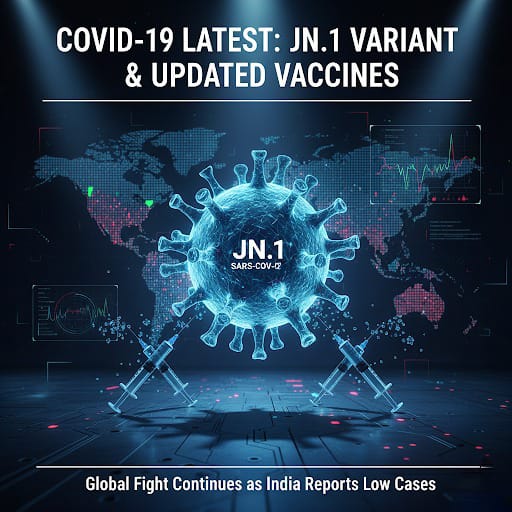
COVID-19 Latest: JN.1 Variant Dominates, Updated Vaccines Rolled Out as India Reports Low Cases
New Delhi, India – As the world continues to navigate the evolving landscape of COVID-19, the latest data indicates a significant shift in dominant variants and vaccine strategies. While India reports a remarkably low active case count, global health organizations are rolling out updated vaccines to combat newer strains, primarily the JN.1 variant, which has shown widespread prevalence.
As of September 1, 2025, India’s active COVID-19 caseload remains minimal, with only 83 active cases reported nationwide. This figure reflects the success of widespread vaccination campaigns and natural immunity over the past few years. However, public health experts emphasize the continued need for vigilance, especially with new variants emerging globally.
Global Variant Landscape: JN.1 Leads the Charge
The World Health Organization (WHO) continues to closely monitor SARS-CoV-2 variants, with JN.1 now classified as a Variant of Interest (VOI) due to its rapid spread and immune-evasive properties. Several other variants, including KP.3, LP.8.1, and NB.1.8.1, are also under active surveillance as Variants Under Monitoring (VUMs). The constant evolution of the virus underscores the dynamic nature of the pandemic, even as its severity has largely decreased.
Updated Vaccines for the 2025-2026 Season
In a proactive move, the U.S. Food and Drug Administration (FDA) has granted approval for updated COVID-19 vaccines for the upcoming 2025–2026 season. These new formulations from Pfizer-BioNTech, Moderna, and Novavax are specifically designed to target recent virus strains, including the prevalent LP.8.1 sublineage of the JN.1 variant. This marks a strategic shift to ensure vaccines remain effective against circulating strains.
Significantly, the eligibility criteria for these new vaccines have been refined. The primary recommendation is now for adults aged 65 and older, and individuals aged 5 to 64 with at least one high-risk health condition. This targeted approach aims to protect the most vulnerable populations while moving away from broad annual vaccination recommendations.
Continued Vigilance and Public Health Recommendations
Despite the reduced severity of the virus, health authorities worldwide, including the WHO and CDC, continue to advocate for key prevention strategies. These include maintaining up-to-date vaccinations, practicing good hand hygiene, ensuring adequate ventilation in indoor spaces, and considering mask-wearing in crowded or poorly ventilated environments. Prompt isolation is advised for those with respiratory symptoms or a positive COVID-19 test, especially for individuals at higher risk of severe illness.
The ongoing monitoring of variants and the adaptive vaccine strategies reflect a global commitment to managing COVID-19 as an endemic respiratory illness.



